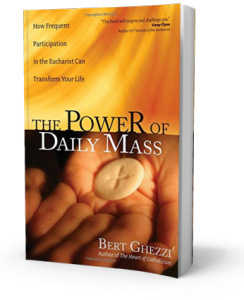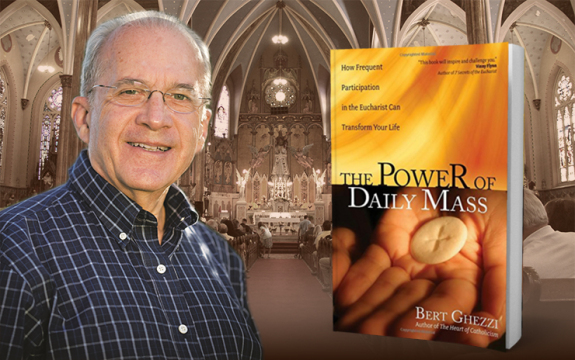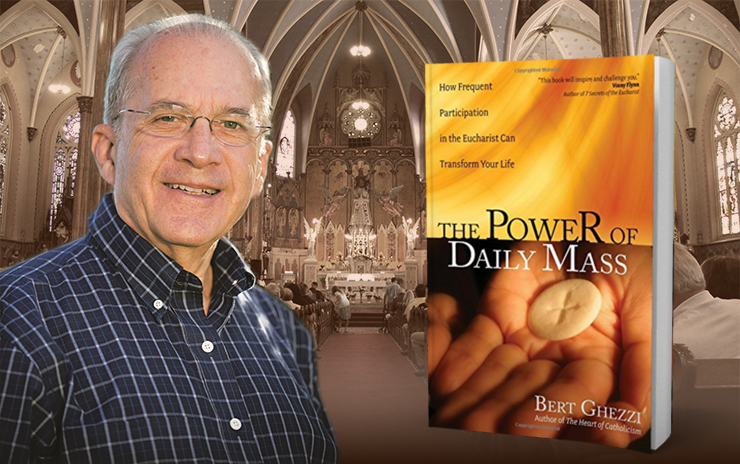After I became Catholic six years ago, my wife and I moved to Orlando and joined our current parish. It was there I met Bert Ghezzi, and we quickly hit off. He wrote books, I read books. He had a large family, we wanted a large family. He was holy, kind, and prayerful, all traits I wanted myself. But one thing especially struck me: Bert attended Mass every day. Each morning, at 7:00am, you could invariably find him praying in his usual pew.
Bert eventually became one of my best friends (and the godfather of our daughter, Teresa.) Over the years, I’ve learned so much from him about prayer, discernment, the saints, and more. But his practice of daily Mass has been perhaps his most significant lesson. We now join him at Mass every day and it’s been incredibly fruitful. In fact, it’s not a stretch to say that committing to daily Mass has been the best decision we’ve made as a family.
Just this week, Bert released his newest book and it’s on this very topic. It’s titled The Power of Daily Mass: How Frequent Participation in the Eucharist Can Transform Your Life (Ave Maria Press). Bert graciously agreed to sit down with me and answer a few questions about it.
BRANDON: In your new book, The Power of Daily Mass, you share how attending daily Mass, consistently for years, has dramatically shaped your life. What benefits have flowed from this commitment?
 BERT GHEZZI: Meeting Jesus in the Liturgy of the Word and receiving him in the Eucharist has helped me to acknowledge his presence and live close to him daily. I know that the Lord wants to communicate with me, so I listen carefully to the readings and prayers for his words for me.. I reflect on what I hear him say during my prayer times and act on his leadings. Lately, for example, I have been thanking him for his life-long kindnesses to me as I heard him remind me that he has never “withheld his tendernesses.” But the main benefit for me has been the privilege of giving myself to him at the Offertory, which I regard as a renewal of my decision to follow him. I especially value the mind-blowing privilege of offering his eternal sacrifice with him at the Eucharist. And receiving him in my heart at communion, so that I can be a Christ-bearer to my family, friends, and people I encounter.
BERT GHEZZI: Meeting Jesus in the Liturgy of the Word and receiving him in the Eucharist has helped me to acknowledge his presence and live close to him daily. I know that the Lord wants to communicate with me, so I listen carefully to the readings and prayers for his words for me.. I reflect on what I hear him say during my prayer times and act on his leadings. Lately, for example, I have been thanking him for his life-long kindnesses to me as I heard him remind me that he has never “withheld his tendernesses.” But the main benefit for me has been the privilege of giving myself to him at the Offertory, which I regard as a renewal of my decision to follow him. I especially value the mind-blowing privilege of offering his eternal sacrifice with him at the Eucharist. And receiving him in my heart at communion, so that I can be a Christ-bearer to my family, friends, and people I encounter.
BRANDON: The more you attend Mass, the easier it is to sink into empty repetition. How do you avoid this danger and remain attentive and active?
BERT GHEZZI: The repetitive structure of the liturgy far from being a danger gives me a form for spontaneous and heartfelt prayer. From the opening prayer to the dismissal, each familiar movement of the Mass presents an opportunity for my uniting with the Lord, the celebrant, and the congregation in fresh acts of worship. So Mass never bores me. After all, the liturgy is a work of Christ—it is his heavenly worship and my privilege to join him.
BRANDON: Besides communing with Jesus at Mass, you also mention the connection to the saints and their liturgical feast days. How do those impact your spiritual life?
BERT GHEZZI: I have been a saint-watcher for many years. Celebrating their birthdays into heaven at daily liturgies draws me closer to them and they draw me nearer to the Lord. On feast days I often remember something about the saint that encourages me. For example, today the liturgy honored St. Basil the Great, a theologian and apologist who personally served the sick and the poor. He inspires me to look for ways to put my faith into action.
BRANDON: In the book you explain how daily Mass offers a special opportunity to receive forgiveness for sins. How does this happen and why does it hold such spiritual value?
BERT GHEZZI: Every day we commit many little sins. Mine tend to flow from me like water from a faucet. And wonderfully, Mass offers us the Lord’s generous forgiveness in several ways. At the very beginning of the liturgy, we prepare to worship by repenting of our sins. But more significantly, the Liturgy of the Eucharist cleanses us of our venial sins. That’s because the Mass re-presents Jesus’ eternal sacrifice which destroyed our sin and death. (But while the Eucharist strengthens us to resist serious sin, it does not deal with mortal sins, which we must confess in the sacrament of reconciliation.)
BRANDON: Many older Catholics born before Vatican II might be skeptical of daily Mass or frequent communion. How would you respond to criticisms that attending daily Mass is just “too much” or “overly pious”, or that it treats the liturgy too flippantly?
BERT GHEZZI: Some pre-Vatican II Catholics may fit in this category, but I have never met one in the three parishes I belonged to in the past 50 years. And most of the people I worship with at daily Mass like me are over 70 years old. But if I met someone skeptical of daily Mass for the stated reasons, I would explain the privileges and benefits of daily worship (for example, offering with Christ his eternal sacrifice and receiving him in the Eucharist); I would ask one of my daily Mass friends to share their experience with him; and I’d ask him to read my book and discuss it with me.
BRANDON: What advice would you offer those who are intrigued by the idea daily Mass, but who doubt they can commit to regular attendance? How can they ease into it?
BERT GHEZZI: Many Catholics have family and work commitments that prevent them from attending daily Mass. I would encourage them to begin attending Mass one day a week by rearranging their morning commitments. One of my friends, for example, worships on Wednesdays at 7 when he does not need to be at work until 8. Maybe for some their parish schedules weekday Masses at times inconvenient for them. I would encourage them to look for a nearby parish that may offer a noon Mass that they might be able attend. But many people could go to daily Mass but don’t, possibly because they do not realize the benefits. I would encourage them to decide to attend daily for a season like Advent or Lent. For example, I have a friend who decided decades ago to worship at daily Mass for Lent and has never stopped.



